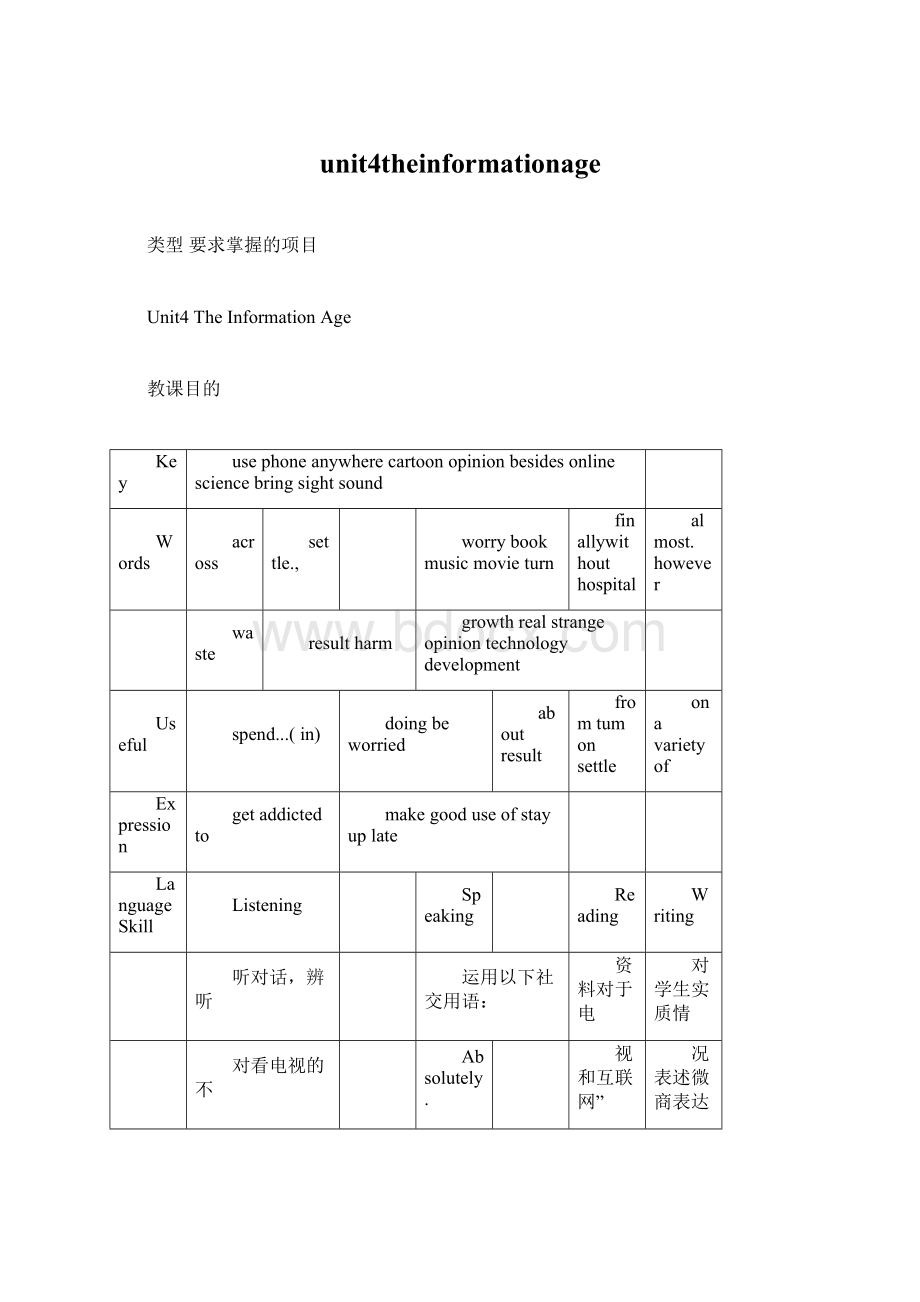 unit4theinformationage.docx
unit4theinformationage.docx
- 文档编号:7920645
- 上传时间:2023-01-27
- 格式:DOCX
- 页数:47
- 大小:34.71KB
unit4theinformationage.docx
《unit4theinformationage.docx》由会员分享,可在线阅读,更多相关《unit4theinformationage.docx(47页珍藏版)》请在冰豆网上搜索。

unit4theinformationage
类型要求掌握的项目
Unit4TheInformationAge
教课目的
Key
usephoneanywherecartoonopinionbesidesonlinesciencebringsightsound
Words
across
settle.,
worrybookmusicmovieturn
finallywithouthospital
almost.however
waste
resultharm
growthrealstrangeopiniontechnologydevelopment
Useful
spend...(in)
doingbeworried
aboutresult
fromtumonsettle
onavarietyof
Expression
getaddictedto
makegooduseofstayuplate
LanguageSkill
Listening
Speaking
Reading
Writing
听对话,辨听
运用以下社交用语:
资料对于电
对学生实质情
对看电视的不
Absolutely.
视和互联网”
况表述微商表达
同见解,培育
That'sexactlywhatIwas
训练阅读理
个人见解。
经过听力收集
thinking.
解能力能掌
信息的能力,
That'sagoodpoint.
握短文的主要
并按要求达成
That'sjustwhatIwanttosay.
信息力理解后
表格内容及填空
That'sagoodidea.
能回答一些
的习题。
Idisagree.
在课文理‘
I'mafraidIdon
’tagree.
解的基础上
Well,itdepends.
掌握重要词
Well,Idon'tknow.
汇和语句的用
等表达对看法的赞成和不一样意。
能复述课
GrammarFocus
WordFormation
(2)
构词法
(二)
构词法中的派生法,掌握-些常有的前缀和后缀。
教课要求与建议
UP
1.教课内容剖析与要求
1)语言知识与语言技术
(1)学习与“现代信息”有关的词汇与表达方式。
如:
cellphone,mobile
phone,computer,Internet,getinformation,writeblogs,netizens,playonline
games,chatonline.
(2)领会两个问题
①WhyareTV,cellphonesandcomputerssopopular
②Doyouthinksomepeopledon’tusethesethingsinagoodway
(3)沟通对看电视、使用手机、电脑等传达信息方式的认识,就上述两个问题论述个人的看法。
2)感情态度与价值观
学会相互合作;正确认识使用现代信息手段,养成优异的个人习惯。
3)重点和难点
(工)运用“热身”部分的词汇和句型进行议论。
(2)用英语描绘书中的四幅图片,论述个人的看法。
4)达到的标准
能用英语进行对于现代信息方式的话题议论,简单描绘图片內容。
2.教课建议
1)导入
T:
Hello,thedevelopmentoftheinformationusedifferentmeanstocommunicate
withyoutellmewhattheyare
(—TV,cellphone,computer,Internet,blog,MSNandsoon.)
T:
havebecomepartofourneedthemevery,we’regoingtolearnmoreabout
them.
2)商讨、研究与实践
(1)认知“热身”部分的词汇及短语。
(2)部署任务,学生疏组,每小组商讨插图,自主研究以下问题:
①WhyareTV,cellphonesandcomputerssopopular
②Doyouthinksomepeopledon’tusethesethingsinagoodway
(3)讲堂实践:
小组代表讲话,向班级报告本组的建议或见解。
以下语句供学生参照:
①SomepeoplealwaysliketowatchTVsittinginasofaatspendtoomuchtime
watchingwhospendtoomuchtimewatchingTVarecalled“couchpotatoes”.
②Peoplecanusecellphonesormobilephonestotalktotlleirfriendsandtheir
familypeopleevenusethemforfunorjustfeel“cool”.
③Somepeopledonothingbutsitinfrontofthecomputera11arecalled“mouse
potatoes”.TheyplaycomputergamesontheInternet,surftheInternet,send,
getinformation,writeblogsandsoon.
④SomenetizensoftenplayonlinegamesorchatonlineintheInternetphenomenon
iscalled“Internetaddiction”
3.教课参照资料
1)Doyouthinksomepeopledon’tusethesethingsinagoodway你感觉有些
人没有适合地使用这些东西吗
inagoodway“用一种很好的方式”。
如:
TheyarelearningEnglishinagoodway.他们学英语的方法很好。
2)“Couchpotatoes”arepeoplewhospendtoomuchtimewatchingTV.“沙发土
豆”就是花太多时间看电视的人。
spend(in)doing“花销做某事”;
spendonSth.“在上花销”。
如:
Hedoesn’tspendmuchtimeonhishomework.他花在作业上的时间不多。
TheyspentthreemonthstouringEurope.他们花了三个月时间漫游欧洲。
辨析:
spend/cost/pay/take
spend“花销”,其主语往常是人,常用于以下句型:
somemoney/sometimeonsth.
somemoney/sometime(in)doingsth.如:
Ispentfiftyyuanonthecoat.我花50元买了这件大衣。
Hespentthreedaysonthework.
=Hespendthreedays(in)doingthework.他干这项工作用了3天。
take“占用、花销”,其主语往常为形式主语“it”或物。
句式是:
Ittakestime/somemoneytodosth.
time/somemoney。
如:
Ittookmethreeyearstobuildthishouse.建这所房屋花销了我3年时间。
cost“花销”,其主语一定是某物。
常用~(sb.)somemOnev。
如:
Thedictionarycostme20yuan.这本辞典花掉我20元钱。
3)信息时代简介
人们常用最具代表性的生产工具来代表一个历史期间,如石器时代、青铜时代、铁器时代、
蒸汽时代。
用这类思想模式来察看20世纪,能够说,人类从电气时代走向了信息时代。
20世纪上半叶,风起云涌的第二次技术革命,以电力的宽泛应用和内燃机的发明为主要标记。
发电机、电动机、电灯、电话、电报、电影、汽车、飞机、钢铁是这个时代的重要标记性产品,这些产品到现在仍是我们平时生活中不行缺乏的一部分。
1901
年,意大利人马可尼成功地进行了第一次无线电通信;
190
工年,第一台洗衣机被制造出来,并于
40年月广为应用;
1903
年,美国人莱特兄弟成功地将世界上第一架飞机“飞翔号”飞上天空,开启了航
空工业;
1903
年,美国人亨利。
福特和此外
11位同业建立了福特汽车企业;
1908
年,第一辆汽车从亨利。
福特家开出;
1907
年,利奥.比克兰发明塑料,制造了当此生活中的千万种物件;
1913
年,世界上第一台家用电冰箱在美国芝加哥出生;
1928
年,美国通用企业生产出第一台电视机;
1939
年,人类成功实现对核能的利用;
新科技革命以电子信息业的打破与迅猛发展为标记,
主要包含信息技术、生物工程技术、新
资料技术、大海技术、空间技术五大领域。
晶体管和大规模集成电路极大地降低了信息流传
的花费,其结果是:
人类社会从工业时代进入了信息时代。
1945年,第一部电子计算机投入使用;
1957年,第一颗人造卫星由前苏联发射升空,开拓了航时节代;
1961年,前苏联进行了人类第一次无人驾驶的宇宙飞船登月试验,并获得成功;
1969年,阿波罗号飞船令人类第一次在月球上留下踪迹;
1983年,第一个机器人在联邦德国大众汽车股份企业投入服务;
1989年,互联网出现,一个崭新的网络经济此后迅猛发展。
LanguageSkill
(I)Listening
1.教课内容剖析与要求
听力资猜中4个学生讨论“对看电视的见解”,培育学生在听的过程中获取重点信息,同时
培育学生的速记能力。
1)重点与要求
(1)娴熟掌握必知必会的单词和短语。
(2)听懂对于“对看电视的不一样见解”。
(3)辨听有关的信息,填写表格。
2)感情态度
对待事物有自己的看法,能一分为二辩证地对待问题。
3)重点与难点
(1)听懂对于“对看电视的不一样见解”的表达,达成填空练习。
(2)听清空白地方缺的词或短语,并能迅速、正确地拼写出来。
4)达到标准
听懂短文,复述有关内容。
2.教课建议
1)导入
DoyouthinkitrighttowatchTVforalongtimewithoutdoinganything
What’syouropinionaboutit
Thenlet’slistentoashortstudentsaretalkingaboutwatchcarefullyandanswerthefollowingquestionsaccordingtowhatyouhear.
ing
2)商讨、研究与实践
(1)听力第一环节Themainidea
Thelisteningtextisadialogueamongfouraretalkingaboutwatchinghave
differentopinionsaboutwatchingTV.
Listentothetapeforthefirsttimeandtellmethemainideaofthelistening.
(2)听力第二环节
Listentothetapeandchoosethenamesofthepeoplewhoaretalkinginthe
conversation.
(3)听力第三环节
阅读练习二的要求,明确本节听力课的任务。
再听资料,注意需要填写的内容。
达成表格。
(4)听力第四环节
再听录音,小组议论.
(5)听力第五环节
全班查对答案,模拟听力录音资料,演练表演对话。
3.参照说明
1)Wecanknoweverythingthathashappenedintheworldwithoutgoingoutof
the
house.不出家门就能知道世界各地发生的每件事。
句中thathashappenedintheworld为定语从句,修饰先行词everything。
注意:
当先行词为不定代词时,其定语从句只好使用“that”指引。
如:
IsthereanythingthatIcandoforyou我能为你做点什么吗
2)Howconvenientitis!
多么方便哪!
convenient“合宜的;方便的,便利的”。
如:
Pleasecomewheneveritisconvenienttoyou.方便的时候,请随时来。
3)Ithinkwatching7Visawasteoftime.我以为看电视是浪费时间。
awasteoftime“浪费时间”。
4)Iagreewithyou.我赞成你的见解。
agreewith“赞成,赞成某人的建议”。
5)atthesametime,theycangetalotofknowledgewhichmaybemuch
moreimportantthantheirhomework.同时,他们能获取很多比作业重要得多的知识。
atthesametime
“与此同时”。
”uchmoreimportant
“更为重要”。
这里
much修饰比较级,表示“更为”。
6)Oh
,itistimeforthecartoon.
噢,到动画片刻间了。
Itistimeforsth。
“到的时间了”。
Itistimetodosth.
“到做某事的时间了”。
7)Whataboutyoutwo
你们二位呢
(
咨询意愿的常用口语
)。
4.听力资料原文与参照答案
ListeningTextandtheanswers
:
Nowyou’llhearashortconversation。
Fourstudentsaretalkingcarefullyandanswerthefollowingquestionsaccordingtowhatyouhear.
aboutwatching
David
:
WhatdoyouthinkaboutwatchingTV
,Susan
Susan
:
Ithinktelevisionisreallycanknoweverythingthathashappenedin
theworldwithoutgoingoutoftheconvenientitis!
Doyouthinkso
,David
David
:
welLIthinkwatchingTVisawasteoftime
。
Betry:
Yes,Iagreewithyou,peoplesit
infront
oftheTVsetsformanyhours
asomestudentsevenforgettodotheirhomework.
Bruce:
Butdon’tforget,Betty,atthesametime,theycangetalotofknowledgewhichmaybemuchmoreimportantthantheirhomework.
Susan
:
istimeforthehavetogowillgowithmetowatchthecartoon
Bruce
:
Me!
Susan
:
OnlyBrucewhataboutyoutwo
David
andBetty:
WewanttosurftheInternet
。
We’regoingtochatonline
with
herat10.
Theanswers:
,David,Betty,Bruce
II)Speaking
1.教课内容剖析(与要求
本单元口语任务是练习表达“赞成与反对”。
学习样板对话,认识小组议论的过程,掌
握怎样表述“赞成与反对”的看法和原因;学习usefulexpressions,掌握表述“赞成与
反对”的看法和原因的常用语句;构成4人议论小组,就“买手机”问题按角色卡片规定内
容分别发布见解,进行议论。
1)重点及要求
(1)掌握。
(2)明确提出看法并陈说相应原因。
2)感情态度
论述自己的看法,以理服人。
3)重点与难点
(1)掌握并运用表达赞成与不一样意的社交用语。
(2)运用语句进行情形对话、沟通。
4)达到目标
掌握表述“赞成与反对”的看法和原因的常用语句;就“买手机”问题发布见解,进行议论。
2.教课建议
1)导入
Peoplehavedifferentopinionstowardsonewantstobuyashebuysone,she
asksherparentsandherbestfriendCindyfOrtheirarehavingaheateddiscussion
about’Sreadthefollowingdialogue.
2)朗诵并分角色表演对话
3)学习表述“赞成与反对”的看法和原因的常用语句,用每种表达方式造一个句子,进
行练习。
4)商讨与研究
学生每4人一个小组,每组按书中提出的要求准备4张角色卡片,组员抽签决定角色,
给3分钟个人准备时间,而后小组就“买手机”问题开始议论,每人表述“赞成”或“反对”的看法和相应原因。
组员间可相互帮助,增补表述内容。
5)教师评论小组议论状况,选优异小组向全班报告表演。
3.角色表述参照典范
1)Youarewanttobuyacellphone.
YouthinkthatacellphoneiSveryusefulbecause
(1)Itisconvenienttogetintouchwithothers.
(2)Icandownloadsomeinformationeasilybyusingit.
(3)IcanlistentomusicwhenI’mtired.
2)YouareJane’sbestdonotthinkJaneshouldbuyacellphonebecause...
(1)It’sexpensivetouseacellphone.
(2)7alkingonthecellphoneisawasteoftime.
(3)Itmakesyouhavenotimetostudy.
3)YouareJane’sdonotthinkJaneshouldbuyacellphonebecause
(1)Itistooexpensive.
(2)Janewillspendtoomuchtimetalkingonthephone.
(3)You’dbetteruseyourtimetostudy.
4)YouareJane’sthinkJaneshouldbuyacellphonebecause
(1)It’sconvenienttocallJane.
(2)It’seasytoknowwhereJaneis.
(3)(3)
III.Reading
1.教课内容剖析与要求
1)语言知识与语言技术的重点及要求
(1)掌握重点词汇和短语的用法,如:
turnon,gothrough
,settle
on,beworried
about
,communicatewith,avariety
of,getaddicted
to,stayuplate,res
- 配套讲稿:
如PPT文件的首页显示word图标,表示该PPT已包含配套word讲稿。双击word图标可打开word文档。
- 特殊限制:
部分文档作品中含有的国旗、国徽等图片,仅作为作品整体效果示例展示,禁止商用。设计者仅对作品中独创性部分享有著作权。
- 关 键 词:
- unit4theinformationage
 冰豆网所有资源均是用户自行上传分享,仅供网友学习交流,未经上传用户书面授权,请勿作他用。
冰豆网所有资源均是用户自行上传分享,仅供网友学习交流,未经上传用户书面授权,请勿作他用。


 对中国城市家庭的教育投资行为的理论和实证研究.docx
对中国城市家庭的教育投资行为的理论和实证研究.docx
